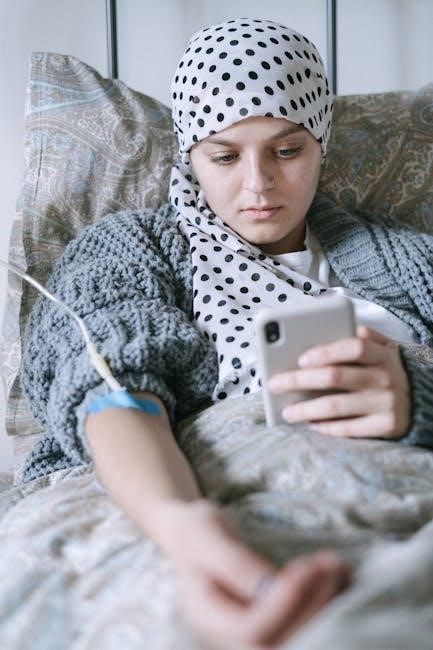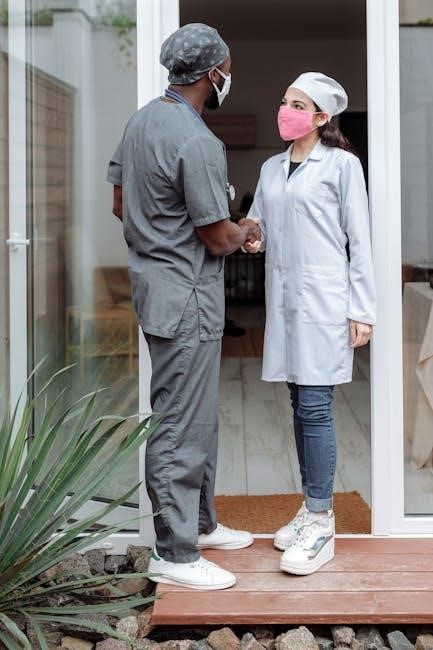The DA-EPOCH-R chemotherapy protocol is a treatment option for non-Hodgkin lymphoma, using a combination of drugs, including doxorubicin, etoposide, vincristine, cyclophosphamide, and rituximab, administered over several days, with
- specific dosage instructions
.
Overview of the Treatment
The DA-EPOCH-R chemotherapy protocol is a complex treatment regimen that involves the administration of multiple drugs over a prolonged period. The treatment typically consists of a combination of doxorubicin, etoposide, vincristine, cyclophosphamide, and rituximab, which are administered in a specific sequence and dosage. The protocol is designed to be flexible, allowing for adjustments to be made based on the individual patient’s response to the treatment. According to the protocol, the drugs are administered concurrently over 96 hours, with the option to adjust the doses based on the patient’s tolerance and blood counts. The treatment is usually repeated every 21-28 days, with the number of cycles depending on the patient’s response and overall health. The DA-EPOCH-R protocol has been shown to be effective in treating certain types of non-Hodgkin lymphoma, and is often used in combination with other treatments, such as radiation therapy. The protocol requires close monitoring and adjustment to ensure optimal results and minimize side effects.
Compatibility of Drugs

The DA-EPOCH-R chemotherapy protocol involves the administration of multiple drugs, including doxorubicin, etoposide, vincristine, cyclophosphamide, and rituximab. The compatibility of these drugs is crucial to ensure safe and effective treatment. According to the protocol, doxorubicin, vincristine, and etoposide can be administered concurrently over 24 hours, while cyclophosphamide is administered on a separate day. The use of a central venous catheter or a peripheral vein is recommended for administration; The drugs can be mixed in a single bag, but it is essential to follow the specific guidelines for preparation and administration to avoid any potential interactions or incompatibilities. The compatibility of the drugs is critical to prevent any adverse reactions or reduced efficacy of the treatment. By ensuring the compatibility of the drugs, healthcare professionals can provide safe and effective treatment to patients with non-Hodgkin lymphoma. The protocol provides detailed guidelines for the preparation and administration of the drugs to minimize any potential risks.

Administration of DA-EPOCH-R
DA-EPOCH-R is administered over several days, with
- specific dosage instructions
and close monitoring of patient’s condition and blood counts, using a portable infusion pump or in a clinic setting, as needed, carefully.
Outpatient Treatment
Outpatient treatment with DA-EPOCH-R is a feasible option for patients, allowing them to receive chemotherapy in the comfort of their own homes. This approach can help reduce the risk of hospital-acquired infections and improve patient satisfaction. The treatment typically involves the use of a portable infusion pump, which is programmed to deliver the chemotherapy drugs over a set period of time. Patients are usually required to return to the clinic for follow-up appointments and to have their blood counts and vital signs monitored. The outpatient treatment schedule for DA-EPOCH-R typically consists of a clinic visit on Day 1 and Day 5, with the remaining days administered at home using the portable infusion pump. This approach has been shown to be safe and effective, with close monitoring of patient’s condition and blood counts, using a combination of drugs, including doxorubicin, etoposide, vincristine, cyclophosphamide, and rituximab, as part of the treatment protocol, with specific dosage instructions, and patient education, on the proper use of the infusion pump, and management of potential side effects, and close follow-up care.
Inpatient Treatment
Inpatient treatment with DA-EPOCH-R is typically reserved for patients who require close monitoring and support during their chemotherapy treatment. This may include patients with severe side effects, those who are at high risk of complications, or those who require frequent blood transfusions. The inpatient treatment setting allows for close monitoring of the patient’s condition, with regular checks of their blood counts, vital signs, and overall health. Patients receiving inpatient treatment with DA-EPOCH-R are usually admitted to the hospital for the duration of their treatment, which can last for several days. During this time, they receive their chemotherapy infusions, and their condition is closely monitored by a team of healthcare professionals. The inpatient setting also provides access to supportive care services, such as pain management, nutrition counseling, and emotional support, which can help to improve the patient’s overall experience and outcomes, using a combination of drugs and therapies, with specific treatment plans, and patient care.

Objectives of DA-EPOCH-R
The primary objective is to treat non-Hodgkin lymphoma using a combination of chemotherapy drugs, with specific goals and treatment outcomes, in a clinical setting, with patient care and support services.
Treatment Goals
The treatment goals of DA-EPOCH-R chemotherapy protocol are to achieve complete remission, improve survival rates, and enhance quality of life for patients with non-Hodgkin lymphoma. This is achieved through a combination of chemotherapy drugs, including doxorubicin, etoposide, vincristine, cyclophosphamide, and rituximab. The treatment protocol is designed to target and eliminate cancer cells, while minimizing damage to healthy cells. The primary objective is to induce complete remission, which is defined as the disappearance of all signs and symptoms of the disease. The treatment goals are tailored to the individual patient’s needs and are regularly monitored and adjusted to ensure optimal outcomes. The use of DA-EPOCH-R chemotherapy protocol has shown promising results in clinical trials, with high response rates and improved survival rates compared to other treatment regimens. Overall, the treatment goals of DA-EPOCH-R are to provide effective and safe treatment for patients with non-Hodgkin lymphoma, and to improve their overall health and well-being. With the use of advanced technologies and
- personalized medicine approaches
, the treatment goals of DA-EPOCH-R can be achieved.
Comparison with Other Regimens
The DA-EPOCH-R chemotherapy protocol is compared to other regimens, such as CHOP and R-CHOP, in terms of efficacy and safety. Studies have shown that DA-EPOCH-R has a higher complete remission rate and improved survival rates compared to CHOP and R-CHOP. The use of rituximab in DA-EPOCH-R has been shown to improve outcomes in patients with non-Hodgkin lymphoma. In contrast to other regimens, DA-EPOCH-R has a unique dosing schedule, with doses adjusted based on patient tolerance and blood counts. This approach allows for personalized treatment and may reduce the risk of adverse events. A
has shown that DA-EPOCH-R has a favorable safety profile and improved efficacy compared to other regimens. Overall, the comparison with other regimens suggests that DA-EPOCH-R is a effective and safe treatment option for patients with non-Hodgkin lymphoma, and may be considered as a first-line treatment. The use of DA-EPOCH-R has been evaluated in clinical trials and has shown promising results.

Benefits and Risks of DA-EPOCH-R
The DA-EPOCH-R protocol has various benefits and risks, including improved survival rates and
- potential side effects
that require careful management and monitoring by healthcare professionals with specific dosage instructions.
Efficacy of the Treatment
The efficacy of DA-EPOCH-R chemotherapy protocol has been extensively studied and evaluated in various clinical trials, with promising results showing improved survival rates and response rates in patients with non-Hodgkin lymphoma.
The treatment protocol involves a combination of drugs, including doxorubicin, etoposide, vincristine, cyclophosphamide, and rituximab, which are administered over several days.
The
- dosage and administration
of these drugs are critical to the efficacy of the treatment, and healthcare professionals must carefully monitor patients to ensure optimal outcomes.
The DA-EPOCH-R protocol has been shown to be effective in treating various types of non-Hodgkin lymphoma, including diffuse large B-cell lymphoma and Burkitt lymphoma.
Overall, the efficacy of DA-EPOCH-R chemotherapy protocol makes it a valuable treatment option for patients with non-Hodgkin lymphoma, and its use is likely to continue to grow in the coming years.
With its proven track record of improving survival rates and response rates, DA-EPOCH-R is an important advancement in the treatment of non-Hodgkin lymphoma.
Potential Side Effects
The DA-EPOCH-R chemotherapy protocol can cause a range of potential side effects, including nausea, vomiting, and fatigue.
Patients may also experience hair loss, diarrhea, and constipation, as well as an increased risk of infection due to a weakened immune system.
The treatment can also cause
- cardiovascular side effects
, such as an increased risk of heart failure and cardiomyopathy.
Additionally, patients may experience neurological side effects, including numbness, tingling, and peripheral neuropathy.
It is essential for healthcare professionals to closely monitor patients receiving DA-EPOCH-R to quickly identify and manage any potential side effects.
By doing so, patients can receive the necessary support and treatment to minimize the impact of these side effects and ensure the best possible outcomes.
The potential side effects of DA-EPOCH-R can be significant, but with proper management and care, patients can reduce their risk and focus on recovering from their illness.
Overall, the potential side effects of DA-EPOCH-R must be carefully considered and managed to ensure the safe and effective use of this treatment protocol.
